Chaplin hits this one out of the park!
 Posted : 17 years ago on 21 April 2008 11:33
(A review of City Lights)
Posted : 17 years ago on 21 April 2008 11:33
(A review of City Lights)City Lights is another tale of the trademark Chaplin character known as the Tramp. As the film opens, the Tramp (Chaplin) is revealed to be sleeping upon an important statue that is being unveiled to the public. After sparking a lot of protest by the people, the Tramp flees and runs into a beautiful blind girl (Cherrill) selling flowers.
After mistakenly giving the impression to said blind girl that he is wealthy, he frequently visits her and is determined to raise money for an operation that would cure her blindness. In the meantime, the Tramp saves a wealthy millionaire (Myers) from committing suicide. The millionaire is eternally grateful to the Tramp, but only recognises him whenever he's intoxicated. Every time the millionaire is sober, he cannot remember being grateful to the Tramp.
City Lights is a frequently hilarious film. For a silent movie the laughs are top notch. Some memorable gags here include a highly amusing boxing match, a set of gags that have the Tramp atop of a large statue and a very clever sequence during a party.
Chaplin expertly mixes a number of excellent gags with deep, tender moments that are truly moving. The final ambiguous encounter of the movie is has been lauded as one of the most memorable and moving moments in film comedy history.
Charlie Chaplin will always be the king of silent movie gags. His trademark costume, his cute walk and his amusing mannerisms have never been matched by any comedians after him. I am especially fond of the way he approaches every situation; never deeply concerned, and never runs out of ideas.
The sight gags are particularly exceptional in this film. And although it's a silent movie it still contains a massive plethora of great quality lines conveyed to the audience via title cards. Virginia Cherrill does an excellent job as a blind protagonist opposite Chaplin.
City Lights is nothing short of an utter masterpiece. It is a brilliantly conceived piece of film comedy that is told perfectly with two outstanding leading actors to carry the film throughout its running time. The entire film is a string of terrific laughs while still having a deep meaning underneath the surface.
It's simple: if you're a fan of Chaplin you'll love it. But if you're not fond of 30's slapstick humour or sight gags then it's not for you.
 0 comments, Reply to this entry
0 comments, Reply to this entry
Brilliant Chaplin stuff!
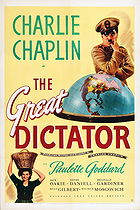 Posted : 17 years ago on 21 April 2008 11:32
(A review of The Great Dictator)
Posted : 17 years ago on 21 April 2008 11:32
(A review of The Great Dictator)Charlie Chaplin quickly became one of the greatest film comedians in cinema history. His films are constantly full of such witty satire, quirky characters and a mixed bag of hilarious gags.
With The Great Dictator I feel that Chaplin has really excelled himself. Although not nearly as good as Modern Times, this addition to Chaplin's résumé is one that is still remembered as one of the greatest achievements in cinema history.
The Great Dictator is a film that spoofs Adolf Hitler and his stance against the Jews that eventually initiated the Second World War. Naturally, the film was a very bold move for its time. While in pre-production no-one ever thought that it would actually be made. A year later the film was in the can and ready for release. The film met with a mixed critical reaction but was a big commercial success.
Many will find Chaplin's style of humour quite hilarious but others may not. It depends on your taste. With The Great Dictator there's a host of purely brilliant gags ranging from sight gags, slapstick gags or just witty dialogue. Heck, I even found it hilarious when Chaplin was doing actions that were accompanied by specially synchronised music. Oh, and a very special mention to the hilariously clever title cards at the beginning of the movie that already had me laughing.
But what I found to be even more genius was that even with scenes of drama as opposed to humour, the film makes an impact. And for this reason it is groundbreaking. Chaplin's speech delivered towards the end of the movie was an especially brave move on the part of the filmmakers. It's qualities like these that we never find in modern comedies like something starring Jim Carrey or Adam Sandler. Unlike these two men, Chaplin's productions are actually brilliant because they take a chance. While still being mighty entertaining in terms of side-splitting gags, he actually delivers a potent message through the films he created.
The Great Dictator is the story of a young Jewish barber (Chaplin) who loses his memory after crashing a plane (that he was riding in upside down) during World War I. When he returns home he's admitted to an asylum. But after escaping the asylum he is unaware of the dictator named Adenoid Hynkel (also played by Chaplin) who has implemented laws against the Jews. He is also unaware of the stormtroopers at Hynkel's command who are persecuting Jews due to his policies and beliefs.
Chaplin plays duel roles here, and does so extremely well. Despite having moustaches for both characters he is capable of showing distinction between the two. He's an exceptionally talented actor who can have the audience laughing by means of physical gags or just a spoken line.
Amongst the memorable scenes we have the dictator playing with a balloon globe, the dictator struggling to look superior to his rival, and a very amusing scene during which barber chairs are elevated to quite enormous lengths. However my only complaint would be the film's length. All the better gags are at the beginning of the film unfortunately and it feels a bit overlong, running at about 2 hours. But even despite the length, the film moves at a brisk pace and is highly entertaining (and essential) viewing.
A very important production. The film also marks Chaplin's first full sound feature.
 0 comments, Reply to this entry
0 comments, Reply to this entry
Hilarious, brilliant, unforgettable!
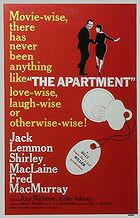 Posted : 17 years ago on 21 April 2008 11:31
(A review of The Apartment)
Posted : 17 years ago on 21 April 2008 11:31
(A review of The Apartment)Writer/director Billy Wilder expertly amalgamates comedy and drama in the critically acclaimed film The Apartment; a screen gem that is still remembered among the greatest films of all time.
For a dated romantic comedy this film is still immensely impressive in terms of innovative ideas, classic story and a vast array of fantastic laughs.
C.C. Baxter (Lemmon) is a regular guy with a steady job of an insurance clerk. He works with thousands of other employees and needs to stand out in order to get a promotion. But Baxter figures out the secret to success when he begins renting out his apartment to four powerful men in the company. These men schedule to borrow his apartment for the day, or the night, to use it for their extramarital affairs. What follows is a series of promotions as Baxter moves his way up the corporate ladder.
But trouble arises when he starts renting his apartment to his boss (MacMurray) who is dating elevator girl Fran (MacLaine). Fran is the girl of Baxter's dreams and he falls for her when she's in a state of emotional distress.
Like Billy Wilder's previous films, The Apartment is brilliant because of the great concepts and the fantastic screenplay (that Wilder penned himself). The dialogue is fascinating, and the filmmaking is engaging. With each new scene, Wilder is able to keep the audience's attention who await the next scene with baited breath.
Because each scene is so well crafted, the attention of the audience is never thrown. I found myself completely immersed in the drama and laughs that make this film so exceptional. It may be dated and many decades old, but the film still remains as one of the all-time classic romantic comedies and one of the best films ever made.
Jack Lemmon has a very appealing on screen persona. He successfully absorbs the complete attention of the audience. He plays his character so that we can empathise with him and care more about his situation. Shirley MacLaine is another fantastic addition to the cast. Like Lemmon, she is very alluring and can get the audience to care about her at the drop of a hat. There are some scenes in particular that showcase some sublime acting from MacLaine. Fred MacMurray was also very, very good as the snobby boss.
All the supporting cast were excellent as well, including some intriguing performances from people as Lemmon's neighbours and colleagues.
Some may pass up the chance to view classic romantic comedies such as these because of how old they are and they'd prefer new rubbish like an Adam Sandler film. If this be the case, you're missing out on an extremely good quality film.
The Apartment is classic in every sense of the word: classic formulaic story, classic stylish performances, classic clever screenplay. Winner of 5 Oscars including Best Picture, Best Director and Best Writing.
 0 comments, Reply to this entry
0 comments, Reply to this entry
Epitome of classic filmmaking.
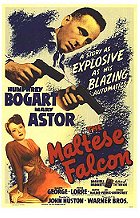 Posted : 17 years ago on 21 April 2008 11:29
(A review of The Maltese Falcon)
Posted : 17 years ago on 21 April 2008 11:29
(A review of The Maltese Falcon)
The Maltese Falcon is a classic, enthralling thriller and the definitive film version of Dashiell Hammett's unforgettable novel. Adapted by John Huston (who also directed), the film marks the big break of actor Humphrey Bogart who went on to star in such beloved classics as Casablanca and The African Queen.
John Huston's The Maltese Falcon is a film that has become an all-time classic, and is still considered one of the greatest movies at all time.
Humphrey Bogart plays a private detective named Sam Spade. When his partner is killed under mysterious circumstances, Sam soon becomes mixed up in a murderous hunt for a valuable statuette that has been described as "the stuff dreams are made of". The fabled treasure, known as The Maltese Falcon, is one of its kind and its current whereabouts is unknown.
This sizzling thriller moves at an invigorating pace and is carried by an abundance of magnificent performances. Aside from Bogart, whose performance was outstanding, there is a host of remarkable supporting players including Mary Astor, Peter Lorre and Sydney Greenstreet.
For a crime thriller, the script was surprisingly excellent. The dialogue was fascinating, with plot twists established exceptionally well. Due to the film's plot twists and unexpected turns, it improves with each new screening. But the film is strictly for those who are looking for intelligent dialogue as opposed to no-brainer crime films we see far too much of in this day and age.
At just about every level, The Maltese Falcon has memorable things to offer. Bogart is frequently charismatic and is able to engage the audience who hang off every word that comes out of his mouth. His character is extremely well conceived, and executed with style by one of the most loved actors of all time.
And who could forget Peter Lorre? Lorre is undoubtedly among the best actors in the film. He creates a great atmosphere and a memorable character.
The Maltese Falcon is a film that has been regarded as being one the greatest films of all time. So what makes the film so great? An unbelievably fascinating story, great performances, an inspirational directorial debut by John Huston and the lightening pace that makes the film remarkable entertainment. My only complaint rests in the lack of chemistry between Mary Astor and Bogart, and the complex story that is a little hard to comprehend at times. But of course, even despite these flaws the film is still a far superior to any crime films we see in the recent contemporary age of cinema. No-one will ever be able to match the sheer genius of this classic masterpiece.
The Maltese Falcon may not be in the league of Casablanca or many other Bogart movies, but it still stands the test of time. Recommended.
 0 comments, Reply to this entry
0 comments, Reply to this entry
Classic stuff! Highly recommended!!
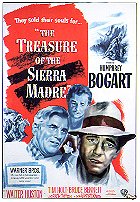 Posted : 17 years ago on 21 April 2008 11:28
(A review of The Treasure of the Sierra Madre (1948))
Posted : 17 years ago on 21 April 2008 11:28
(A review of The Treasure of the Sierra Madre (1948))
The Treasure of the Sierra Madre is a riveting classic adventure tale that made a huge impression on global cinema. Even though it's over 60 years old the film holds a major influence on the way adventure films have been made to this day.
Many will wonder what makes the film so special. For me it was a great way to spend two hours because it was highly entertaining, fascinating and has a high sense of excitement. Then underneath the surface we have a great underlying message about human nature and the lust for greed.
The Treasure of the Sierra Madre is a tale set in 1920s Mexico. Two poor men named Dobbs (Bogart) and Curtin (Holt) are desperate for a pay check and will do anything to strike wealth. Lucky for them they run into an old codger named Howard (played by director John Huston's dad Walter) who endlessly drones on about mining for gold and knowing the spot where one can find gold worth hundreds of thousands of dollars.
And so the three men set out into the mountains for a spot of gold prospering after pooling together their funds to purchase all necessary equipment. During their adventure they encounter bandits and Indians but none of these threaten them as much as something they never anticipated - human nature and greed.
This classic tale is one high adventure film that you won't want to miss. It delivers a sense of true adventure; making the experience exhilarating and a whole heap of fun. But what really makes this one unlike all other adventure films is its subconscious message about how easily mankind can be corrupted and manipulated by the thought of money.
Some of the scenes throughout the movie during which characters quarrel over the gold is spellbinding. Because of the fantastic characters we can easily find ourselves engaged in what's going on for the film's two hour period.
And what was imperative for this to work? It's simple - the extraordinary performances from everyone in the cast. Humphrey Bogart was already an established star and was raking in lots of money. Especially after The Maltese Falcon and Casablanca this man was extremely distinguished amongst the thousands of other actors working at the time. Bogey's portrayal was captivating and brilliant. He got his role perfected in no time. He seemed like a gruff, poor beggar at the beginning of the movie. And by the end we get the sense of what occurred after he got his hands on such a large amount of gold. His lust for wealth got the better of him, and Bogart gets his character across in a stunning way.
Walter Huston, father to director John Huston, finally received an Oscar as the aging gold prospector. Clearly there are little flaws to find in his character. Tim Holt was only known for trashy B-Grade flicks up until he got his big break here. He is always so focused, and so dissimilar to the other two protagonists. With this in mind, each of the three title characters are so divergent.
John Huston both wrote and directed the film himself. He was without question the perfect man for the job. He excelled himself, and I liked this film better than The Maltese Falcon which is also among the screen greats.
Above all this, the cinematography is what sold the film for me. Each location was brilliant and looked completely gorgeous on the big screen. The use of such dense bush and the sense of isolation totally blew me away.
But wait - there's more. Just when you think things couldn't get any better, I also found the invigorating score by Max Steiner to be the perfect way to top it all off. I don't think there are any flaws to be pointed out in this classic production. Quotable lines, great messages about humanity and just all round inspiring filmmaking.
The Treasure of Sierra Madre is a phenomenal achievement and will forever be a movie that stands the test of time. It's groundbreaking, exciting and adventurous. Quite simply if you've never seen this classic cinematic gem then you have no idea what you're missing out on.
 0 comments, Reply to this entry
0 comments, Reply to this entry
Why can't I give it 0/10?!
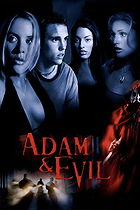 Posted : 17 years ago on 21 April 2008 11:27
(A review of Adam Evil (2004))
Posted : 17 years ago on 21 April 2008 11:27
(A review of Adam Evil (2004))The film was dull, clichéd, horrible and almost painful to watch. Not much of a plot, really, just a group of teenagers go to a camp-ground, they're warned about murders that occurred there a few months ago (Surprised?), they start partying and then a murderer starts killing all the teens.
Now, back up, anyone think this sounds like Friday The 13th 200: Jason Gets A Makeover or something? God, the cinematography was hopeless and the acting was pathetic.
Each actor sounded contrived and appalling; breathing absolutely nothing into an already lifeless script. Needless to say the script was one of the worst piles of rubbish to get the green light in a very long time.
I appreciate the fact that it's probably meant to be B-grade and shoddy...but this is just plain inexcusable not to mention highly demoralising. Lots of unnecessary violence, profanity and filthy dialogue are all that make up the script. And none of the lines sounded natural at all, especially when the actors spewed all their lines out on camera in such an artificial way.
It must take a director really devoid of any talent to get involved with this crap. I can't waste anymore of my time warning you, but if you must watch this film I suggest you watch it with a heap of mates while accompanied by nibblies, pizza and fizzy drinks as you will enjoy ripping it off. Adam & Evil is nothing more than a film to watch plainly for the prospect of having a good laugh at how dreadful it is.
 0 comments, Reply to this entry
0 comments, Reply to this entry
Dreadful!
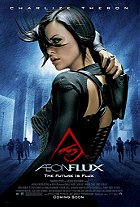 Posted : 17 years ago on 21 April 2008 11:25
(A review of Æon Flux)
Posted : 17 years ago on 21 April 2008 11:25
(A review of Æon Flux)
Aeon Flux is really quite dreadful; nothing more than a no-brainer sci-fi live-action flick based on the animated TV series.
First of all, the style and atmosphere are terribly artificial. There's far too much CGI and digitally expanded sets that detract highly from the overall film value. As a result of this heavy reliance on CGI we can't get engaged in the film at all. The characters are all horribly conceived but executed worse. The actors are all terribly wooden not to mention lifeless and unexciting. And for the final nail in the coffin, the film is so awfully predictable beyond belief!
Aeon Flux is a sci-fi film set 400 years into the future subsequent to 99% of the world's population being wiped out by a virus. The only survivors live in a society with a corrupt government. A group of rebels called 'The Monicans' attempt to overthrow the government and put an end to this corruption of the highest level that has gone on too long. Then when one of their soldiers named Aeon Flux (Theron) is sent to assassinate the chairmen named Trevor Goodchild (Csokas) she discovers a whole new mystery.
The only thing that holds this rubbish together would be the action scenes that are tame but mildly entertaining. There are guns aplenty as well as many characters that do nothing more than showcase their acrobatic skills in front of the camera.
Charlize Theron is an actress I usually admire, but unfortunately here she's emotionless, dull, lifeless and just plain terrible. It would take a long time to mention all the members of the cast I was disappointed with, but I think it goes without saying that even the extras couldn't bring anything good to the table. The direction was very empty, and the atmosphere filled with CGI only made it increasingly hollow. The music didn't add anything more to the movie.
Aeon Flux had the potential to be the decade's The Fifth Element but unfortunately it screwed up every opportunity it had. There is no wonder that it took me so long to finally finish watching this film. It's even more two dimensional than the cartoon! And hence, I kept getting increasingly embarrassed to watch the movie and it continued watching it another day. Boy, I wish I never decided to give this film a shot. My advice, and I suggest you take it: Avoid!
 0 comments, Reply to this entry
0 comments, Reply to this entry
Classic in every sense of the word.
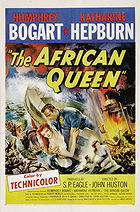 Posted : 17 years ago on 21 April 2008 11:22
(A review of The African Queen (1951))
Posted : 17 years ago on 21 April 2008 11:22
(A review of The African Queen (1951))By this time in his career, John Huston was already established as a capable filmmaker who had previously helmed such classics as The Maltese Falcon and The Treasure of the Sierra Madre. And of course, Huston could only call one man to fill the title role: Humphrey Bogart. The African Queen is deservedly an incredible classic that rightfully sits amongst the greatest films of all time. Films like these can still be thoroughly enjoyed even during the time of modern cinema.
Humphrey Bogart and Katherine Hepburn make a magnificent screen couple in this dazzling, exciting adventure film set during World War I. Bogart is Charlie Allnut; an aging alcoholic who lives in the forests of Africa and owns a boat called The African Queen. As Charlie arrives at a small African village he discovers that the Germans had attacked recently; capturing many of the Africans that resided there. Charlie agrees to take a woman missionary named Rose (Hepburn) under his wing to ensure her survival for the duration of the war. Although the two have their bitter differences, they travel in The African Queen downstream with hope of sinking a German ship that would assist the allies in winning the war. Predictably, the two fall in love during their unique river adventure.
The African Queen was widely acclaimed by both critics and audiences upon release, and is still a much loved classic to this very day. It's a shame that many moviegoers overlook this movie due to its age because quite frankly this film is superior to a lot of rubbish produced by Hollywood in this day and age. Humphrey Bogart delivers another critically acclaimed performance as the aging sea captain. This is most certainly a change on his usual character; instead of being charismatic and charming, Bogart is an alcoholic with a short temper and doesn't care much for his surroundings. Katherine Hepburn was a remarkable companion for Bogey in this one. Because she is so sophisticated and a real lady, it was quite hilarious at times because Bogey's character is the complete opposite.
John Huston's directing is superb as always. He is able to utilise such gorgeous locations to make the viewer really feel in the centre of the dense jungle. The atmosphere is very genuine and very colourful. On top of all this, some great visuals are accompanied by a pleasant score. The script was exceptionally written and contains some very naturalistic dialogue.
The African Queen scores as a highly enjoyable adventure film that was filmed beautifully on location in Africa. Highly recommended!
 0 comments, Reply to this entry
0 comments, Reply to this entry
Unforgettable classic.
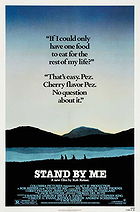 Posted : 17 years ago on 21 April 2008 11:21
(A review of Stand by Me)
Posted : 17 years ago on 21 April 2008 11:21
(A review of Stand by Me)
Stand by Me is a timeless screen gem based on a Stephen King novella called 'The Body'. The film marks one of the best Stephen King translations to the big screen; this poignant, touching classic is quite simply a masterpiece.
Stand by Me is a film that follows three young boys about to enter their teen years; Gordie (Wheaton), Chris (Phoenix), Teddy (Feldman) and Vern (O'Connell). The plot is quite simple; Vern is underneath his house digging furiously for his pennies when he overhears a conversation regarding the final resting place of a missing boy who is presumed dead. The boy was hit by a train but has not been found by authorities. The four young boys decide that they want to be heroes and head off on a journey to find the corpse. They figure that if they report the location of the body to the authorities they'll get their 15 minutes of fame in the local newspapers. With this goal in mind they set out on a journey to the location of the body. This journey is filled with bonding and arguing that you'd come to expect from 12-year-old boys.
Not only is this a tender narrative but also a coming-of-age tale of young boys ascending into manhood. The film's story is told in flashback to narration by Richard Dreyfuss. The opening introduces us to Dreyfuss' character, which is followed by the aforementioned flashbacks that accurately display pre-pubescent males of the 1950s.
Dreyfuss' character amusingly uses a complex vocabulary while the title characters on screen speak so immaturely; cheaply throwing insults at each other and each other's mothers.
The problem with most child actors is that they usually fail to engage the audiences during complex situations. Stand by Me contains performances prominently by a group of boys between the ages of 11 and 12. Understandably, I was reluctant about this idea at first. Maybe it was Reiner's skilled directing, or maybe it was the acting talent of the four principal children; either way I found the acting to be stellar. I was astounded at the brilliant results achieved by the young actors. There's also a very recognisable Kiefer Sutherland who pops up as a typical teenager bully. Because I had seen so much of Sutherland's recent work I was shocked at how youthful he looks.
Thankfully the whole cast were given a remarkable script to feast on. The dialogue is realistic, as are the members of the cast. Some scenes called for sublime acting, especially when the boys were meant to be in tears. The young cast pull it off with wonderful results.
Stand by Me can't be missed because of how moving, touching and emotive the whole experience is. Stand by Me is a simple story but contains a powerful message about the ascension in adulthood. Memorable, riveting and brilliant. I can't believe it took me so long to finally watch this one. Funniest moment: the gross (but amusing) story about a young fat boy getting revenge on his enemies by initiating a barf-fest in a tent during a pie-eating contest.
 0 comments, Reply to this entry
0 comments, Reply to this entry
A masterpiece of action cinema
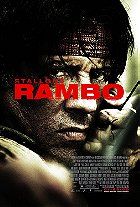 Posted : 17 years ago on 21 April 2008 09:09
(A review of Rambo)
Posted : 17 years ago on 21 April 2008 09:09
(A review of Rambo)
John Rambo has always gotten a bad rap, as he's perpetually misconstrued by both the supporting characters in his films as well as the cynical movie-goers of the outside world who dismiss him as a joke. This is, of course, because the iconic action hero is best remembered as the cartoonish, buff instrument of Regan-era American vengeance from 1985's Rambo: First Blood Part II and 1988's Rambo III. Due to this, people forget that Rambo's introductory film, 1982's First Blood, is a superb action-drama dealing with America's post-Vietnam disillusionment and one man's failed fight to reincorporate himself into society. For 2008's Rambo (a.k.a. Rambo IV), Sylvester Stallone (co-writing and directing in addition to starring) returns the character to his roots, emulating the tone and emotion of First Blood to craft a gritty, poignant war picture that doesn't skimp on the action. What's truly daring about Rambo - and what a lot of critics have missed - is Stallone's decision to resurrect the ironic warrior to lament his soul rather than simply celebrate his strength.

The story, expectedly, is simple and direct. Twenty years have passed since John Rambo (Stallone) saved Colonel Trautman from Soviet forces in Afghanistan, and he now lives the life of a recluse in Thailand, working as a snake catcher while desperately trying to evade his personal demons. As the film opens, a group of ideological Christian missionaries - including Michael (Paul Schulze) and Sarah (Julie Benz) - approach Rambo seeking passage into the heart of Burma, wishing to bring medical supplies and prayer books to the war-torn country. Rambo reluctantly accepts the offer, but is wary of the dangerous terrain. Weeks later, Rambo learns that the missionaries were captured by the Burmese military. Choosing to assume his psychologically tattered soldier mentality and launch into battle once again, Rambo joins a group of mercenaries as they head into Burma on a rescue mission.
Stallone prefaces Rambo with authentic documentary footage depicting the actual situation in Burma, which has endured what is described as the longest-running civil war in history. This horrific footage effectively places the story in a real-world context, emphasising that the atrocities taking place in Burma are real, rather than a part of the screenwriter's imagination. In this sense, Stallone and co-writer Art Monterastelli utilise Burma as a framework within which they constructed a typical but effective action/war movie. Yet, layers of appreciable complexity exist within the simplistic framework which may be easily missed. For instance, the Burmese soldiers appear to be the epitome of one-dimensional evil since they slaughter villagers and gang-rape women, but the opening documentary footage reveals that these soldiers are kidnapped boys who are forced into the army and dehumanised into soulless killing machines.

Ultra-high body counts are a staple of the series, and Rambo does not disappoint in this sense. The levels of gore push the R-rating to the very brink, yet the unremitting violence is not as joyously self-indulgent as previous Rambo adventures. See, there's more to Rambo than just carnage. The film builds with a palpable intensity, and the first half depicts Rambo reluctantly working his way back to his former self to confront the life he tried to leave behind. By depicting the Burma atrocities in explicit detail, the film additionally offers social commentary and sheds light on the realities of life in the country (the film has done more for Burma awareness than the UN). Thus, this entry to the series is more about authenticity and gritty realism, mirroring the tone of First Blood. Rambo is not perfect, of course - it's largely generic (at times painfully so), and the dialogue is derisive on occasion - but the positives outweigh the negatives. There is sufficient character development to create a palpable sense of humanity amid the carnage.
Yet, all of this is probably looking too deeply into what is a taut, expertly crafted shoot-'em-up of pure awesomeness. You attend Rambo movies to watch the titular badass lay waste to hundreds of bad guys, and this fourth instalment offers precisely that. In prior Rambo sequels, Rambo was dropped in some hellhole to rescue a bunch of people before he breaks them out, kills the bad guys and escapes. Rambo '08 stays true to the formula, except - as previously stated - there's more grit: Stallone is never shirtless at any point, and Jerry Goldsmith's exciting yet cheesy music is replaced with Brian Tyler's harrowing, exceptional original score. Rambo even works as a member of a team, as opposed to taking down hundreds of soldiers single-handedly. Up until Rambo, Sly had never directed an action film (outside of allegedly ghost-directing some of his classics), but the actor-director's excellent handling of the material here belies his inexperience. Sly may utilise a shaky-cam approach, yet the style benefits the picture and is at no point distracting. And my word, the picture delivers in terms of action - the final battle is a celluloid tribute to the blood-soaked mayhem of the '80s. For all the criticisms Rambo endured, the violence is deserved: it characterises the villains, and provides the audience with a sweet sense of vengeance. It's a superb, insanely effective macho fantasy, and it will appeal to its target market.

Returning to his iconic role, Stallone is cold as ice, and brings a sense of menace that is lacking in previous entries. John Rambo is truly scary here; he's a powder keg waiting to explode, and he certainly does explode once the action shifts to the camp where the missionaries are held captive. It's not an Oscar-worthy performance, but it is more nuanced than most will admit. Julie Benz is also effective as one of the missionaries, ably playing alongside Stallone. Rambo jumps through hoops for Sarah, but she is not a love interest - although she is Rambo's prime motivation for battling the Burmese army, it's because she profoundly touched his soul. In the supporting cast there's also the likes of Matthew Marsden and Graham McTavish, both of whom are standouts as mercenaries. Suffice it to say, every actor hits their mark.
Infused with a poignant social commentary to provide sufficient context for the action, Rambo exists to call attention to the atrocities in Burma in addition to providing a fitting end for John J. Rambo. In First Blood, Rambo's breakdown in the film's final minutes left us with the sense that he wanted to discover who he is and put the past behind him. This theme was never brought full circle in the following two sequels, but Rambo '08 does exactly that, providing the ending that fans have yearned for since the commencement of the franchise. One could argue I've read too much into Rambo, but I believe critics are not reading enough. It would be a shame for a viewer's preconceptions to overwhelm Stallone's achievements, which goes for both the cynical critics looking to be critical as well as the action fans seeking a fix. There is a beating heart at the core of Rambo, whether you wish to notice it or not.

Interesting to note, Stallone's extended director's cut of Rambo is the superior edit. It fleshes out the characters more effectively, and the film as a whole feels more cohesive and complete. [Link removed - login to see].
8.3/10
 0 comments, Reply to this entry
0 comments, Reply to this entry
 Login
Login
 Home
Home 183 Lists
183 Lists 1662 Reviews
1662 Reviews Collections
Collections